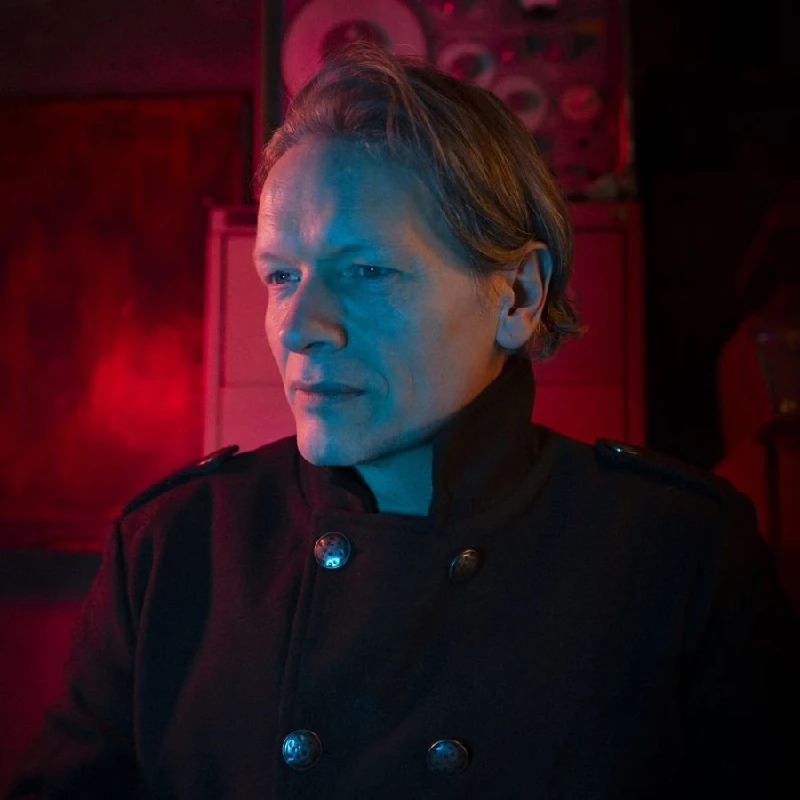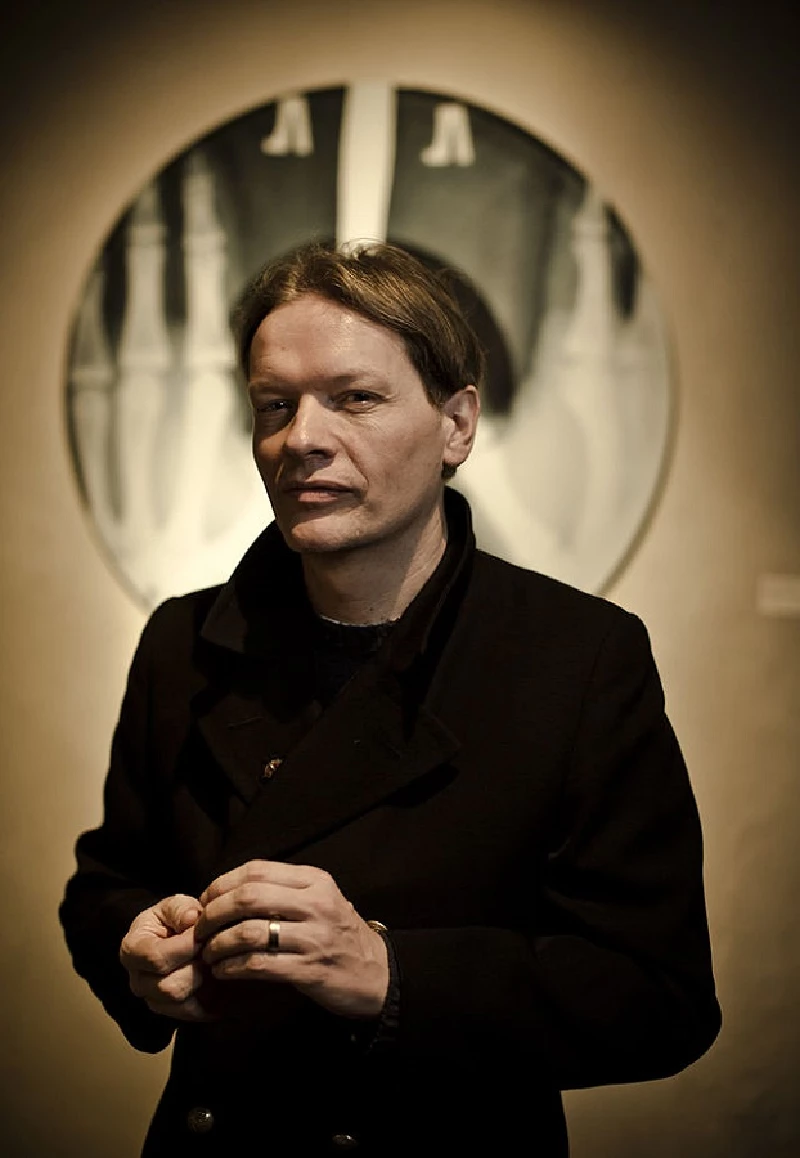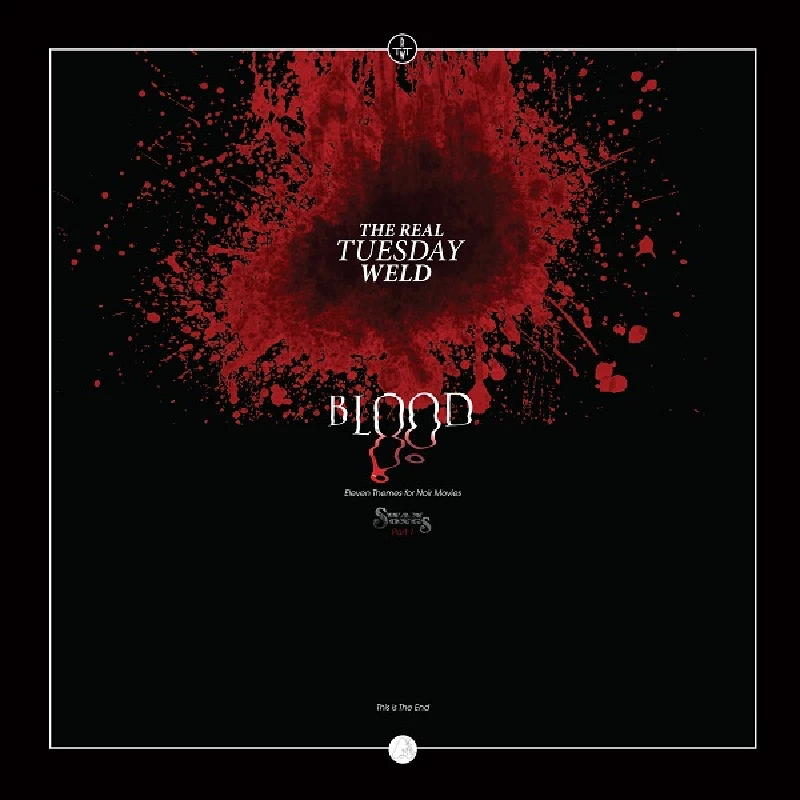Real Tuesday Weld - Interview
by John Clarkson
published: 29 / 7 / 2021

intro
Stephen Coates, the London-based songwriter and composer with The Real Tuesday Weld, speaks to John Clarkson about 'Blood', the first of three farewell albums for the group to be released over the next year, and why he has decided to finish with the band now.
In the 2000s and the early years of the last decade, The Real Tuesday Weld released seven critically acclaimed studio albums, including ‘When Cupid Meets Psyche; (2001), ‘I, Lucifer’ (2002), ‘The London Book of the Dead’ (2007) and ‘The Last Werewolf’ (2011). The Real Tuesday Weld, which is effectively a solo project for London-based songwriter and composer Stephen Coates, became renowned for its torch songs, cinematic soundscapes. striking use of guest female singers and offbeat humour, but, other than its annual and traditional Christmas EPs, has spent most of the last decade in hiatus while Coates has focused on writing film music and other projects. Now The Real Tuesday Weld has released ‘Blood’, its first album in ten yearswhich Coates says will be one of three farewell albums to be released over the next year. ‘The noirish Blood’ is being released on vinyl in a limited edition of 300 copies and digitally. Pennyblackmusic spoke to Stephen Coates about ‘Blood’ and why he has decided to end The Real Tuesday Weld. PB: You have described ‘Blood’ as being the start of an extended farewell for the Real Tuesday Weld yet the last official studio album was ‘The Last Werewolf’ which came out in 2011 and, other than you annual Christmas EPs, you have not done much with the band in recent years. Do you see this as much as a reformation as a finish? SC: You’re absolutely right. The last studio album was ‘The Last Werewolf’ in 2011, but I have actually released quite a lot of stuff - Christmas EPs and various film and other soundtracks -i n between,. I have always been doing music but mainly writing stuff for other people. After ‘The Last Werewolf’, which is a concept album for a book, I lost my sense of what an album is (Laughs), because the world had changed a lot in terms of streaming and things like that. I hadn’t got s sense of what an album is these days, so I went through a period of not knowing what to make of that. I was still writing a lot of material, and I decided to bring the band to a sort of close, a dignified end, and that the theme of these albums would be a kind of goodbye set, which gave me a structure to release this stuff. PB: You have said that you don’t want to “fizzle out like a spent firework” and cited “all sorts of reasons: romantic, psychological, astrological” for splitting. What are the main reasons? Is it simply because with everything else you have got on going you don’t have time? SC: No, the main reason is that I was thinking about what happens to other bands. Most bands either break up acrimoniously - and The Real Tuesday Weld can’t really break up a acrimoniously because in the studio it is just me -, or more often than not they just fizzle out. You think, “Oh, whatever happened to, say, The Bluetones,” and it is like, “Oh, they just stopped making records." i didn't want that for The Real Tuesday Weld. I wanted to take a leaf out of David Bowie’s book, which is a bit pompous really (Laughs), and have a definite end to it, so it not an end to me making music, but an end to this kind of music. Bowie did it all the time. He was always killing himself off. It will have been twenty years and by the time it is done it will have been ten albums , and I felt, “Well, that is enough. Move over and let the kids have a go (Laughs).” PB: To pick up on your point about streaming ,‘Blood’ and its two follow-ups are being released on limited edition vinyl and digitally. You have done some quite lush CD packaging in the past. Why have you decided to put out these last three releases out on vinyl and not on CD? SC: Well, actually, we are going to put out a CD set of the whole thing at the end. I had conceived of it originally as a triple album, but I was talked out of it by everybody I spoke to (Laughs), They told me that it was commercial suicide. to which I said, “And…what’s new?” (Laughs). There was this sense that it was perhaps a bit too much of a meal of three albums at once unless you are a prog rock fan. Vinyl gave a nicer, structured format for me. It is definitely an object and it is a bit more high end with all this lovely stuff that you can pour over as well, Then you have got streaming which I love as well. I think that they are both great. We are fortunate in that we can have both streaming and vinyl, aren't we? PB: ‘Blood’ has been released initially with a limited edition cassette called ‘Tape Dust Memories’. Why did you decide to do this? SC: I was always a fan of bands that gave quite a lot to their fans, and I really appreciated the community of people that kept me going by their support and encouragement, so I liked the idea of making a sort of bonus for them. As it is on cassette. It comes with a download token. You don’t have to buy a cassette recorder as well. It is just a limited edition thing for the first few people. It was just that. I am a fan, and I like it when bands do extra stuff and go the extra nine yards. PB: You said in a previous interview that you enjoy writing most of all songs for strong women. What is the main appeal to you of that? SC: In a funny way I would be quite happy not to sing on any Real Tuesday Weld records myself. I always wanted to write for other people, and it helps me to do that to put myself in a character of a woman for some songs. That goes right the way back to the first record,. I like that kind of Ute Lemper/Liza Minnelli thing, those kind of strong female singers. I love that style. PB: There are three female guest singers on ‘Blood’ -Oriana Curls, GG McEwen and Sephine Lo. Who are they and how did they become involved? SC: Oriana Curls is a very talented French jazz singer. She has done more electronic stuff recently but she lives in London, and I met her through a mutual fan. Oriana is a super-talented musician. She hasn’t broken through yet but I think that she will do, GG McEwen is a violin player. When I was recording a track for ‘The Last Werewolf’, we were recording strings at a studio in Brixton. She was one of the string players, and she was singing along to songs as we were recording them, and I heard her voice and thought, “Wow! She is an amazing singer.” When we went on tour she became our live singer with me, playing violin and singing, and then we recorded these tracks when we came off tour. She is another super talented person who should be a star. Not yet but hopefully soon. Sephine Lo is another violin player and a singer and a composer in her own right. and she tours with us as well. They are all people that I have met along the way. I call myself a brick shithouse surrounded by three angels (Laughs). PB: Oriana Curls on ‘Blood Knuckled and Dusted’ pulls off the double trick of absolutely rejecting the man in her life but sounding in absolute bits about it. Was that your intention? SC: It is meant to be that she is both vengeful and despairing at the same time, rather than it being some sort of love song which is one-dimensional. A lot of us go through contradictory emotions when we break up with someone, and that is what I wanted to capture. PB: How much direction do you give your female vocalists? SC: With Oriana. she was a bit out of her range. I wanted her not to do a diva thing but to do something more intimate and so I directed her a bit, but generally I let people do their thing and I have benefited from letting people do their own thing on my songs. PB: ‘Blood’ contains a wonderful cover of Lady Gaga’s ‘Poker Face’. What was the appeal to you of covering Lady Gaga?. SC: I love Lady Gaga. I think that she is just one of those star people, super-stylish, a very talented, great songwriter, a great performer and sort of edgy. ‘Poker Face’ is an absolute masterpiece as a song. It is very dark for a pop song. If you listen to the words, it is really dark but also a little bit cheeky. It is amazing that it got to the top of the charts (Laughs). I just admire her. PB: You got the name of the band after having a dream about the actress Tuesday Weld, and ‘The Floating Man’ on 'Blood' was inspired by another dream about an acrobat. What happened in that dream? SC: I had this idea that I came out of my former flat in Clerkenwell in London, and i was walking up the road and there was a guy hanging in the air with a tuxedo on. The strange thing was not that he was hanging in the air, but nobody paid any attention at all and people were just walking past until he fell. He fell out of the air and then everyone started screaming. That was what that dream was about (Laughs). PB: The final two Real Tuesday Weld albums will be called 'Dreams’ and ‘Bone’. In what ways will they differ from ‘Blood’? SC: ‘Dreams’ will be hopefully out at the end of this year if we can get it back from the pressing plant. There is a six month delay at the moment. It is much more bucolic. 'Blood’ was a noir album. ‘Dreams’ is more summery and a bit more electronic, and then ‘Bone’ is the final one, and it is going to go full circle back to the slightly pre-war jazz sound that we started with. PB: Have they been recorded yet? SC: ‘Dreams’ is done, and I am about about halfway through 'Bone'. PB: Were all the songs on the three albums written over the last few years or do some go back further? SC: No, they were all written in the last ten years and a big chunk of them were written in the last two or three years. There is going to be a bonus album with both 'Dreams' and ''Bone' as well. so that covers about six albums worth of stuff. PB: One of the strangest things you have done is work on a game soundtrack with Claudia Brucken. How did that come about? SC: After ‘The Last Werewolf’ came about. I was signed for a while to an American record label Fifth Degree. and I had spent some time with them in Los Angeles working on soundtracks with filmmakers. I was with my family at Christmas, and I got a phone call on Christmas Eve and I could tell that it was a Los Angeles number, and I was like, “I don’t really want to answer this because it is Christmas but I better because it is work.” It was this guy with a very heavy American accent and the first thing he said to me was “Can you write some songs about a 1940’s jazz singer?” and she was a heroin addict and possibly a pyromaniac, so I said, “Yeah! I am going to start right now.” I loved the brief. It was the same thing again for me, writing songs for a woman, so i wrote the songs and I recorded them with PInkie Maclure, who is brilliant and a Scottish singer and has a terrific voice. The versions we did were amazing and I sent them off to Los Angeles and it was for this company Rockstar Games. and they were like, “We love the songs, but we want to get a more famous singer,” and I was thinking, “Hmm. I don’t know why” because Pinkie’s versions were great. As it turns out, the boss of Rockstar Games was a massive fan of Propaganda, Claudia’s original band. He said, “We want you to do it with Claudia,” and so I went to meet her, and we really got on well. I embarrassed myself - She is a very elegant lady and I had to persuade her to do it- but as I was leaving and instead of stepping into her hall I stepped into her cleaning cupboard (Laughs) She was very decent about about me putting my foot in her mop bucket, but despite that she agreed to do and that is how we met and we worked on it. PB: You have spent much of lockdown up in Northern Scotland. Why did you choose to move up there? SC: I was staying in Findhorn. I has rented a house up there pre-lockdown. and was going to be spending time there anyway. I had a small studio up there. It was more by accident. I should have been in London but I was blessed to have the opportunity to be up there with lots of space. Lockdown was a very painful thing. but it was quite useful for me to be up there because I could get down to finishing off these records and I also wrote a book at the same time. So, that was a massive benefit to me. I am back in London now, but apart from the whole Covid thing it was a privilege to be there. PB: What is the book about? SC: Over the past seven years I have had this big project about forbidden music in the Soviet Union. I spent a lot of time in Russia, performing and doing various projects, and I have got this project called the X-Ray Audio Project which is about the music there in this Cold War era in the 50's and 60's. There was an exhibition and I have made films and I wrote a book and this is the sequel. It is a book about the culture of bootlegs and forbidden music in the Soviet Union from the 1930s through to the 1960s, and why music was forbidden and how people got around the censor, cutting and distributing their own records in a kind of punk way. It is coming out at the end of the year with Strange Attractive Press. PB: What are your plans musically once the Real Tuesday Weld finally finishes? SC: I think the final album will be out by, I guess, August or September next year. I might squeeze out one more Christmas EP out by the of 2022 because we have had this tradition of doing Christmas EPs and it might be nice to finish off with that, and then that is it. I am done. After that I want to carry on working on films and documentaries and collaborations with other people, writing for and recording with other people. I love writing for people and doing stuff with them, and that is what I am happiest doing. That is going to be my main priority once The Real Tuesday Weld finishes. PB: Thank you.
Band Links:-
https://therealtuesdayweld.com/https://www.facebook.com/therealtuesdayweld
https://twitter.com/realtuesdayweld
Play in YouTube:-
Have a Listen:-
Picture Gallery:-


bandcamp
soundcloud
most viewed articles
current edition
Peter Doherty - Blackheath Halls, Blackheath and Palace Halls, Watford, 18/3/2025 and 21/3/2025Armory Show - Interview with Richard Jobson
Liz Mitchell - Interview
Lauren Mayberry - Photoscapes
Deb Googe and Cara Tivey - Interview
Max Bianco and the BlueHearts - Troubadour, London, 29/3/2025
Garfunkel and Garfunkel Jr. - Interview
Maarten Schiethart - Vinyl Stories
Clive Langer - Interview
Sukie Smith - Interview
previous editions
Heavenly - P.U.N.K. Girl EPBoomtown Rats - Ten Songs That Made Me Love....
Trudie Myerscough-Harris - Interview
Doris Brendel - Interview
Beautiful South - Ten Songs That Made Me Love...
Dwina Gibb - Interview
Kay Russell - Interview with Kay Russell
Pulp - Ten Songs That Made Me Love...
Barrie Barlow - Interview
Sound - Interview with Bi Marshall Part 1
most viewed reviews
current edition
Davey Woodward - Mumbo in the JumboNigel Stonier - Wolf Notes
Wings - Venus and Mars
Kate Daisy Grant and Nick Pynn - Songs For The Trees
Only Child - Holy Ghosts
Neil Campbell - The Turnaround
Philip Jeays - Victoria
Darkness - Dreams On Toast
Suzanne Vega - Flying With Angels
Charles Ellsworth - Cosmic Cannon Fodder
Pennyblackmusic Regular Contributors
Adrian Janes
Amanda J. Window
Andrew Twambley
Anthony Dhanendran
Benjamin Howarth
Cila Warncke
Daniel Cressey
Darren Aston
Dastardly
Dave Goodwin
Denzil Watson
Dominic B. Simpson
Eoghan Lyng
Fiona Hutchings
Harry Sherriff
Helen Tipping
Jamie Rowland
John Clarkson
Julie Cruickshank
Kimberly Bright
Lisa Torem
Maarten Schiethart